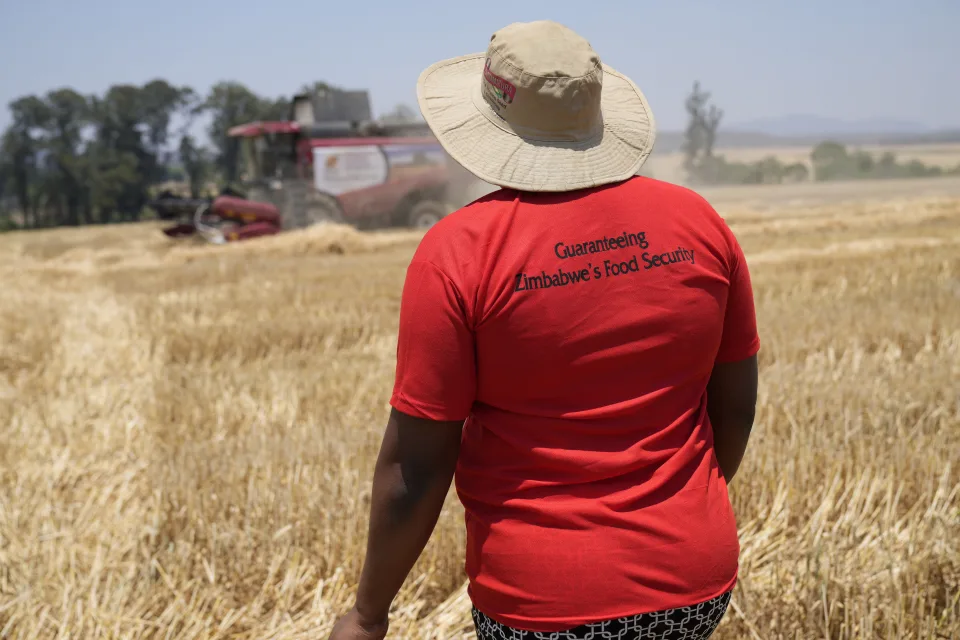October 28, 2022
Zimbabwe Emerging As Leading Wheat Producer in Southern Africa

Located in the southern part of Africa, Zimbabwe is emerging as a leading wheat producer in the region. While many African countries are vulnerable to the impact of Russia-Ukraine crisis, uncertain when wheat will be delivered from the ports of Russia and Ukraine, Zimbabwe has intensified efforts in redirecting and mobilizing resources for cultivating wheat and other agricultural produce for the population – an import substitution measure that has won praise these few months.
Large parts of Zimbabwe are covered by forests with abundant wildlife, but the local farmers are utilizing the savanna lands ombined with the subtropical climate for grains production in efforts to overcome food supply problems caused by the war in Ukraine. Zimbabwe will now boast of its biggest wheat harvest in history.
Like other African countries, Zimbabwe has for decades relied on imports to offset low local production. After Russia’s invasion of Ukraine resulted in global shortages and price hikes, the country wanted to ensure “self-sufficiency at all costs,” Deputy Agriculture Minister Vangelis Haritatos told The Associated Press in October.
The country expects to harvest 380,000 tons of wheat, “which is 20,000 more than we require as a country,” Haritatos said. That is up from about 300,000 tons produced last year. “We are most likely to get the highest tonnage since 1962, when wheat was first introduced to Zimbabwe. A lot of countries are facing shortages, but the opposite is happening in Zimbabwe,” Haritatos said.
While other hunger-stricken African countries are struggling with reduced wheat imports due to the war in Ukraine, Zimbabwe is looking at using its anticipated surplus of the grain to build “a small strategic reserve” for the first time in its history, agriculture minister Anxious Masuka told journalists earlier in October. This would cushion Zimbabwe against future shocks.
Masuka said Zimbabwe plans to bump up wheat production to about 420,000 tons next season, giving the country room to keep building its strategic reserve and become an exporter of the grain. Wheat is Zimbabwe’s most important strategic crop after corn.
African countries – which imported 44% of their wheat from Russia and Ukraine between 2018 and 2020, according to U.N. figures – were hit hard by the global shortages and price hikes of grains as a result of the war. The African Development Bank has reported a 45% increase in wheat prices on the continent.
African nations were at the center of Western efforts to reopen Ukraine’s ports as the United States and allies accused Russia of starving the world by denying exports from Ukraine, a key global grain exporter. African leaders also visited Russia to meet with Putin over the issue.
Zimbabwean President Emmerson Mnangagwa in April described the war in Ukraine as a “wake-up call” for countries to grow their own food. The answer in Zimbabwe has been to empower local farmers, said Haritatos, the Deputy Agriculture Minister.
That included roping in hundreds of small-scale, rural farmers to start growing a crop that was traditionally reserved for large-scale commercial farmers, improving water supply infrastructure and distributing fertilizers to small-scale farmers as well as increasing private-sector participation. The crop was introduced for the first time to areas and farmers who had never grown wheat before.
Winter corn production has given way to wheat in many areas, with Zimbabwe banking on corn reserves to meet demand for the staple food. Land used for growing wheat increased from 66,000 hectares (163,089 acres) in 2021 to 75,000 hectares this year and will grow to 100,000 hectares next season.
“A lot of countries discount small-scale farmers because they are so small that individually they cannot effect much change,” Haritatos said. “But we organized them into clusters and convinced them that it was possible. The quality of most of their crops is premium.” He said the war in Ukraine had made Zimbabwe “realize that we shouldn’t rely on other countries for food that we can grow on our own.”
In a widely acknowledgement the Russia-Ukraine crisis has shattered global economy. It has created instability especially in terms of soaring food prices and consequently leaves indelible impacts on Africa. One fundamental effect is that economic gains recorded previously are being eroded by the Covid-19 and Russia-Ukraine crisis in Africa.
With this rising uncertainty, at least, the Chairperson of the African Union Commission, Moussa Faki; President of Guinea-Bissau and Chairman of the Economic Community of West African States (ECOWAS), Umaro Sissoco Embalo, and BRICS member and South African President, Cyril Ramaphosa attempted to hold diplomatic talks with President Vladimir Putin.
More than half of the African continent remains indifferent and consistently complain of the effects of the crisis in the light of mounting tension among the population. The common message, in this challenging and critical moment, relates adopting dialogue to end the crisis. It further relates, within the international law, respect for territorial sovereignty.
Significant to note that during business conference held at the Atlantic Council’s Africa Center on April 22, African Development Bank Group President Dr. Akinwumi Adesina, speaking as a guest of the Washington, DC, US-based think tank, called for import substitution policies and support for increasing domestic agricultural production in Africa.
Adesina said Africa must rapidly expand its production to meet food security challenges. “The African Development Bank is already active in mitigating the effects of a food crisis and ready to provide African countries with the resources needed to raise local food production and procure fertilizer. My basic principle is that Africa should not be begging. We must solve our own challenges ourselves without depending on others.”
With the advice given by the chief of the African Development Bank, now Zimbabwe is emerging and leading in its biggest harvest of wheat without a begging bowl, has adopted an import substitution measure that would save the national coffers and cut import expenditure.
The country is very rich in mineral resources and is the largest trading partner of South Africa on the continent of Africa. As a member of the Southern Africa Development Community (SADC), Zimbabwe is a landlocked country located in Southeast Africa, and shares borders with South Africa, Botswana, Zambia and Mozambique.



